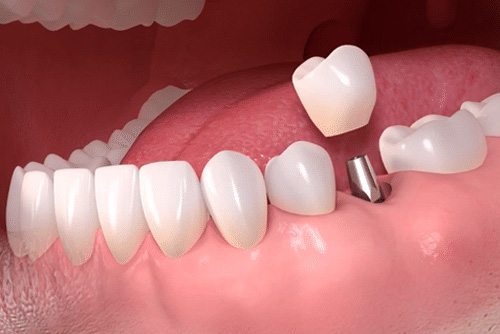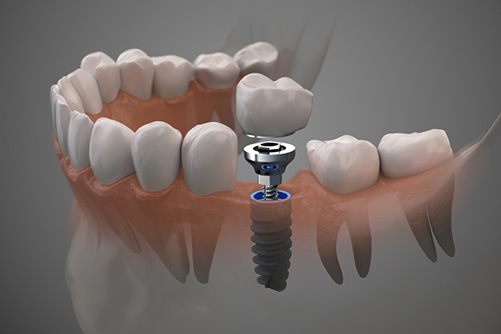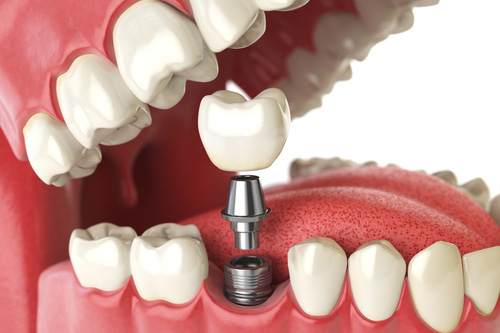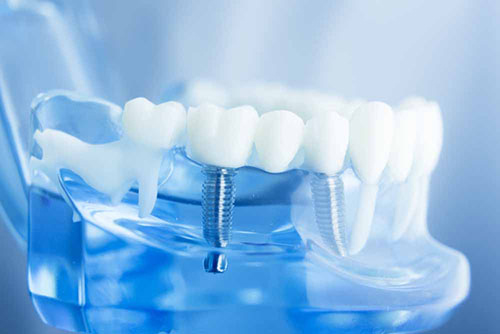Dental Implant Procedure in Turkey, Prices and Details

- What is an implant?
- What types of dental implants are there?
- What should be considered before a dental implantation?
- What happens during the placement of an implant?
- What are the advantages of an implant?
- Does placing a dental implant hurt?
- Is an implant suitable for everyone?
- What can go wrong with a dental implant?
- Are there dentists who specialize in dental implants?
- How much does a dental implant cost?
- What should be considered after a dental implantation?
What is an implant?
A dental implant is a fixed medical anchor for an artificial tooth (dental crown) that serves as a long-term replacement for a missing tooth. Usually dental implants include three elements: implant body (artificial tooth root), superstructure (abutment) and tooth crown (visible part). The implant itself is usually a cylindrical or tooth root-like titanium screw or zirconium screw that is placed into the jawbone by the dentist. Over a period of several weeks, the implant and the jawbone grow together. Once this bone integration has completed, the implant can carry an artificial tooth, closing the tooth gap in the dentition.The implant crown is a custom-made artificial tooth. Due to the tailor-made production of the crown in terms of fit and colour, it looks and feels like a natural tooth.
Thus, a dental implant is a good solution for people who lose their teeth due to tooth decay, periodontal disease or trauma.
What types of dental implants are there?
There are basically two main dental implant forms: endosseous and subperiosteal implants.Endosseous implants are the most commonly used. The implant is placed in the jawbone.
In contrast, the subperiosteal dental implant is attached to the top of the jawbone. This type of implant is mainly used when the jawbone is not very high or a necessary bone structure (augmentation) is not promising.
What should be considered before a dental implantation?
Regardless of whether it is just one or more dental implants or whether one or more surgical interventions are planned, proper preparation is required in all cases. This includes the following steps, which the patient should definitely request from the dentist:Comprehensive dental exam - This involves taking x-rays and 3D images and assessing the patient's general oral health
History - The treating dentist should get a good overview of the medical history of the patient. Therefore, all medical conditions and medication intake, both prescription and over-the-counter, should be discussed
Treatment plan - This treatment plan is tailored to the individual situation of the patient and takes into account parameters such as the periodontal situation, the number of teeth to be replaced, the condition of the jawbone and the remaining teeth.
Medical cost plan - The dentist prepares a cost estimate for all expected costs.
This gives the patient a good basis for decision-making.

What happens during the placement of an implant?
Dental implantation is usually an outpatient procedure . With immediate implant placement , the tooth is placed in the same session after tooth extraction. In the case of delayed implantation , depending on the bone defect, the tooth is placed six weeks to three months after tooth extraction.The advantage of immediate implant placement is that only one intervention is necessary. However, the aesthetic risk is somewhat greater, since the development of the gums is not 100% predictable. With delayed implantation, the risk of failure is lower.
Regardless of whether it is an immediate or delayed implantation, the following steps can be distinguished:
- Extraction of the damaged tooth or the remains of a tooth
- Preoperative ridge build -up - This is only necessary in rare cases. In most cases, the bone can be built up at the same time as the implantation.
- Inserting the dental implant - After exposing the bone, holes are drilled into the bone into which titanium or zirconium screws are screwed.
- Bone growth and healing - This is also called osseointegration. The jawbone grows onto the surface of the dental implant and connects to it.
- Insertion of the artificial tooth (dental crown) - After a healing period of several months, an individually manufactured artificial tooth is attached to the titanium screw.
The entire treatment can take many months from start to finish. The essential factors here are how fast the healing process is and how fast the jawbone grows, so that there is stable bone integration.
Depending on the process chosen, the materials used and the individual situation, certain steps can also be combined. Late implantation can also be necessary if the bone as the implant bed first has to regenerate after major inflammation. However, it is important to ensure that the period after tooth extraction is not too long, as the bone continues to shrink for up to six years after extraction.
What are the advantages of an implant?
A major benefit of a dental implant is that it replaces a lost tooth root. It acts as a carrier for a crown or as a bridge abutment and thus enables fixed dentures. This leads to the closure of tooth gaps. Removable prostheses can also achieve much better stability and fit with implants. Implants are also clearly superior to dentures in terms of functionality and chewing function. Other advantages of dental implants are:
- Better preservation of the affected bone area , because a dental implant prevents atrophy, the physiological breakdown of the bone
- Lower risk of caries for neighboring teeth
- Less sensitivity of the neighboring teeth
- No extra cleaning effort , as they are cared for like all other natural teeth in the course of oral hygiene at home.
In addition to these advantages, there is also a very emotional advantage for many patients. Dental implants feel like natural teeth.

Does placing a dental implant hurt?
Placing a dental implant is painless as it is usually done under local anesthesia . In rare cases, anesthesia may also be necessary.Occasionally, the following symptoms may occur:
- Pain at the site of the dental implant
- Light bleeding
- Bruising on the gums or skin
- swelling of the gums or face
The severity of the symptoms varies depending on the number of implants placed and also the current condition of the patient.
Standard medication such as ibuprofen can be taken for 2-3 days after the procedure to relieve pain. An antibiotic can also be prescribed depending on the individual situation.
Is an implant suitable for everyone?
Although the implant is very widely used, a dental implant is not suitable for everyone. Because even if prerequisites such as good general health and a healthy jawbone are given, the general individual oral health must be taken into account. For example, whether the gums are inflamed or there is periodontal disease. The success rate can also be affected by individual lifestyle habits such as smoking, the intake of certain medications or chronic diseases such as diabetes mellitus, metabolic disorders, bone loss (osteoporosis) or a restricted immune system, for example due to chemotherapy.When and why is it advisable to choose an implant and not a dental bridge?
Basically, an implant is the first choice. Because this type of denture comes closest to the look, feel and functionality of a natural tooth. Compared to bridges and prostheses, dental implants are usually better adapted to the respective situation.
It should also be noted that with dental implants, in contrast to bridges, no bridge abutments have to be ground down and the neighboring teeth are preserved as a whole. This is not the case with tooth-supported dental bridges. Here the neighboring teeth have to be trimmed, which weakens the teeth per se. Single implants are easier to clean than bridges, which improves oral hygiene.
A bridge solution can be an alternative if the bone supply is very small and bone augmentation is difficult or not desired. A prerequisite is a low susceptibility to caries and a good periodontal situation of the teeth, ie no periodontitis . It is also advantageous if the tooth root is intact or has been supplied by a successful root canal treatment .
Even if bridge solutions appear attractive compared to dental implants due to possible cost advantages in the initial treatment, it should be considered that dental bridges mean more effort in daily oral hygiene at home and are more susceptible to repairs, which can again be expressed in higher overall costs.
What can go wrong with a dental implant?

Proven experts usually have a very high success rate (>95%) . With experienced implantologists, technical errors such as the implant being placed too high, too deep or too close to the neighboring tooth, or placed despite too little bone, are extremely rare.
Nevertheless, despite preventive measures, complications can also occur with specialists:
- Implant not healing after insertion (1-2%)
- Damage to nerves or tissue - An implant can be accidentally placed too close to a nerve. This can cause numbness, tingling, or pain
- Inflammation of the gums around the dental implant
- Receding gums around the dental implant
- Progressive bone loss (peri-implantitis) resulting in insufficient bone support
- To a very, very small extent, the dental implant is rejected or not tolerated by the body.
Against this background, a regular check -up of the dental implant is highly recommended, especially in the first few months after treatment.
Are there dentists who specialize in dental implants?
As with many products and services, providers specialize in certain areas and can therefore offer higher quality products. This also applies to dental implants.For example, the chance of success of a tooth implantation increases if the specialist, based on his experience and skills , extracts the damaged tooth in a way that is as gentle as possible to the bone . The more intact the jawbone is, the better the bone integration of the dental implant usually succeeds.
There are also special training and advanced training qualifications for implantology. These formal quality features can be the first indication of the seriousness of the provider.
A dental implant is not a quick fix and requires a multi-step treatment plan, as is the case with other dentures. Therefore, take your time and pay attention to factors other than the initial cost estimate when making your selection.
The patient should be aware that it is a long-term investment that will accompany him in everyday life for many years. As with other long-term investments such as living space or a car, it is worth finding out more. Make sure you have a good basis for making decisions before you decide on a place where you will have the procedure performed.

How much does a dental implant cost?
There are no fixed total costs for implants. Because several factors can influence the cost framework:
- the number and type of dental implants needed
- the position of the dental implants in the jaw
- whether additional treatments are required to prepare the mouth or bone for the procedure
For example, it may be necessary for an existing gum disease, such as periodontitis , to be treated in advance. This means that the costs for periodontal therapy must also be taken into account before the implantation can begin.
In any case, before the start of treatment, a treatment cost plan should be drawn up by the dentist so that a cost estimate is available for orientation and as a basis for decision-making.
Depending on the type of private health insurance or dental insurance, parts of the costs are covered by the insurance companies, as is the case with other forms of dentures.
Due to the increased minimum costs for a dental implant (> 1000 EUR), patients can be unsure at the beginning. However, the long track record and benefits make the dental implant a valuable investment for a carefree everyday life.
What should be considered after a dental implantation?
Experienced experts inform your patients about the right individual aftercare both before they decide on a dental implant and after the treatment. It is therefore highly advisable to follow these aftercare instructions. Other general advice is:
- Do not chew anything and especially no hot food and drinks while the local anesthetic is working
- No strenuous physical activity for 2-3 days immediately after treatment
- Light and soft food for a few days after the treatment eg broth, smoothies, applesauce, mashed potatoes and therefore rather no hard bread crusts, raw vegetables or very sticky things like honey.
- Regular, careful cleaning of the dental implant and the gums, especially as an infection prophylaxis in the first 48 hours after the operation
- Pay attention to possible symptoms such as inflammation or pain

In principle, the same applies to artificial teeth as to natural teeth. Regular careful oral hygiene at home is essential. You should also arrange regular dental check-ups and appointments for cleaning the areas below the gumline.
If you carefully follow the post-operative instructions, you will make a significant contribution to your own chances of success. Patients with a history of periodontitis in particular should do everything possible to prevent a recurrence.
There are no comments yet. Would you like to add a comment?
In accordance with Article 10 of the Personal Data Protection Law (PDPL,KVKK) titled Data Controller's Obligation to Disclose, we use cookies in accordance with the legislation, limited to the purposes specified in the privacy policy.

